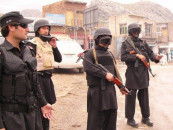Should Pakistan care about Ebola?
Patients are now receiving experimental treatments, but they are not available on wide scale

The federal government recently issued an advisory to the provinces, informing them about risk factors and advising precautionary measures, information that they already have. No other direction, in case of infection entering the country, for preparing plans or other operational details , for financial or manpower requirements.
But the horror Ebola is wreaking across Liberia, Sierra Leone and Guinea should make us take note. Almost all the factors facilitating its spread in western Africa — porous borders, population density, weak health systems, a lack of public information and understanding (even, in some cases, among doctors, as a 2002 study showed) — are present in Pakistan as well. Given the ways of the modern world, and the vicious ease with which Ebola spreads among people, there is a very real risk that it will enter this country: All it takes is, essentially, one person on a plane. If this happens, the Pakistani health system is in no position to cope.
As a disease, Ebola, discovered in 1976, seems like the very antithesis of hope. Its natural reservoir is in wild bats, but it is highly contagious among humans, spreading by direct contact with infected fluids or by indirect contact with contaminated environments. Its manifestation includes flu-like symptoms, but becomes far worse; vomiting, diarrhoea, organ dysfunction and internal and external bleeding follow. According to the WHO, in an Ebola outbreak, up to 90 per cent of those who catch it will die. Death by multiple organ failure comes usually within about two weeks of the first symptoms.
With Ebola, we cannot even rely on the tactics we’ve put all our polio hopes on, since no vaccine exists — there are no drops, no shots to give. There is no easy treatment for those who do get the disease; the best that can be offered right now is supportive therapy and good nursing care. A few patients are now receiving experimental treatments, but they are not available on the kind of wide scale that the African outbreak requires.
For Pakistan, as for Sierra Leone and Guinea and Liberia, the only chance — the only real hope — is to do the thing that is simplest in theory and hardest in practice, as the African countries are learning yet again: try to prevent outbreaks from occurring and spreading. Ebola patients have to be strictly isolated; their families cannot wash or bury their dead. Health workers must have rigorous security measures in place — rigorous, but uncomplicated: They need protective gear, a way to handle soiled linen, gloves.
These simple practices cannot be wished into existence. Governments -– even those governments that have so far avoided this scourge — need to have plans in place — everything from screening at airports and entry points to follow-ups by epidemiologists. The needs in terms of doctors, nurses, epidemiologists, social mobilisers, health educators, data managers have to be identified. People with thousands of other problems to worry about need to worry about Ebola, to know what to do if this one makes its way onto their plate. Central governments have to work with the provinces or the states, with private organisations and with international agencies to make sure that the system is as strong as it can be.
This is a country that thrives on hope. Despite or perhaps because of all that Pakistan has suffered, we wait for revolutions; we pray for the silver bullet; we spend our time looking for magic wands, because once we find them, it will take only a wave to fix our broken, crumbling country and heal its wounded people. With such hope always in our hearts, there seems little worry about preparatory plans.
There’s nothing wrong with having hope — in this case it only makes sense — but in Pakistan hope has become a disability. We put it on like a blindfold and ignore all the work we should be doing. We are out there hunting in haystacks for a needle, trying to find some magic wand. It is still an if that Ebola would enter the country, but if it does, that blindfold will be ripped from our eyes very quickly and we will find ourselves in a position where even hope will do little good.
Published in The Express Tribune, August 20th, 2014.
Like Opinion & Editorial on Facebook, follow @ETOpEd on Twitter to receive all updates on all our daily pieces.



















COMMENTS
Comments are moderated and generally will be posted if they are on-topic and not abusive.
For more information, please see our Comments FAQ